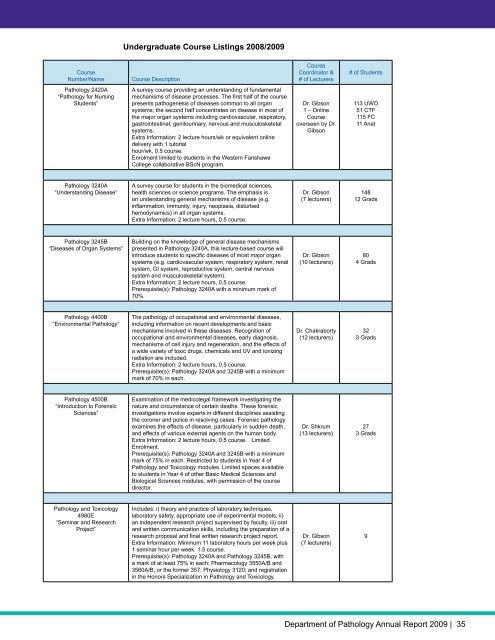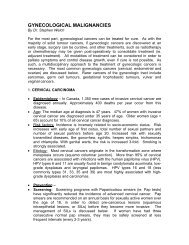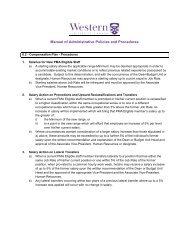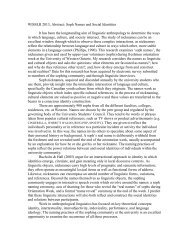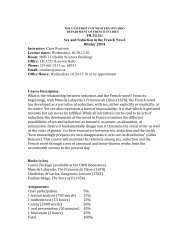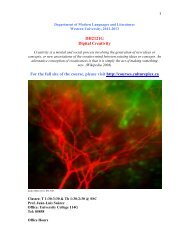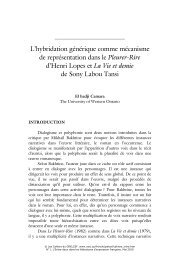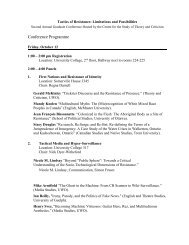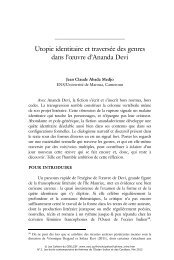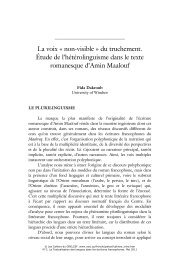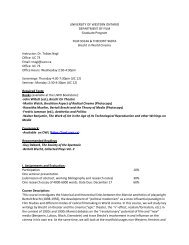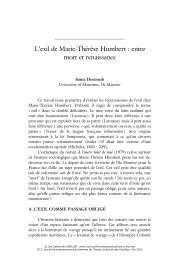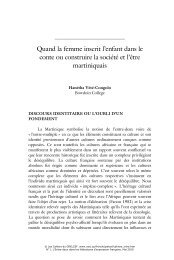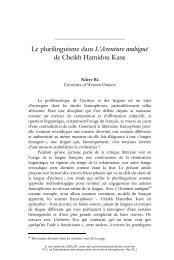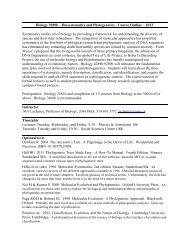Department of Pathology ANNUAL REPORT 2009 - University of ...
Department of Pathology ANNUAL REPORT 2009 - University of ...
Department of Pathology ANNUAL REPORT 2009 - University of ...
You also want an ePaper? Increase the reach of your titles
YUMPU automatically turns print PDFs into web optimized ePapers that Google loves.
Course<br />
Number/Name Course Description<br />
<strong>Pathology</strong> 2420A<br />
“<strong>Pathology</strong> for Nursing<br />
Students”<br />
<strong>Pathology</strong> 3240A<br />
“Understanding Disease”<br />
<strong>Pathology</strong> 3245B<br />
“Diseases <strong>of</strong> Organ Systems”<br />
<strong>Pathology</strong> 4400B<br />
“Environmental <strong>Pathology</strong>”<br />
<strong>Pathology</strong> 4500B<br />
“Introduction to Forensic<br />
Sciences”<br />
<strong>Pathology</strong> and Toxicology<br />
4980E<br />
“Seminar and Research<br />
Project”<br />
Undergraduate Course Listings 2008/<strong>2009</strong><br />
A survey course providing an understanding <strong>of</strong> fundamental<br />
mechanisms <strong>of</strong> disease processes. The first half <strong>of</strong> the course<br />
presents pathogenesis <strong>of</strong> diseases common to all organ<br />
systems; the second half concentrates on disease in most <strong>of</strong><br />
the major organ systems including cardiovascular, respiratory,<br />
gastrointestinal, genitourinary, nervous and musculoskeletal<br />
systems.<br />
Extra Information: 2 lecture hours/wk or equivalent online<br />
delivery with 1 tutorial<br />
hour/wk, 0.5 course.<br />
Enrolment limited to students in the Western Fanshawe<br />
College collaborative BScN program.<br />
A survey course for students in the biomedical sciences,<br />
health sciences or science programs. The emphasis is<br />
on understanding general mechanisms <strong>of</strong> disease (e.g.<br />
inflammation, immunity, injury, neoplasia, disturbed<br />
hemodynamics) in all organ systems.<br />
Extra Information: 2 lecture hours, 0.5 course.<br />
Building on the knowledge <strong>of</strong> general disease mechanisms<br />
presented in <strong>Pathology</strong> 3240A, this lecture-based course will<br />
introduce students to specific diseases <strong>of</strong> most major organ<br />
systems (e.g. cardiovascular system, respiratory system, renal<br />
system, GI system, reproductive system, central nervous<br />
system and musculoskeletal system).<br />
Extra Information: 2 lecture hours, 0.5 course.<br />
Prerequisite(s): <strong>Pathology</strong> 3240A with a minimum mark <strong>of</strong><br />
70%.<br />
The pathology <strong>of</strong> occupational and environmental diseases,<br />
including information on recent developments and basic<br />
mechanisms involved in these diseases. Recognition <strong>of</strong><br />
occupational and environmental diseases, early diagnosis,<br />
mechanisms <strong>of</strong> cell injury and regeneration, and the effects <strong>of</strong><br />
a wide variety <strong>of</strong> toxic drugs, chemicals and UV and ionizing<br />
radiation are included.<br />
Extra Information: 2 lecture hours, 0.5 course.<br />
Prerequisite(s): <strong>Pathology</strong> 3240A and 3245B with a minimum<br />
mark <strong>of</strong> 70% in each.<br />
Examination <strong>of</strong> the medicolegal framework investigating the<br />
nature and circumstance <strong>of</strong> certain deaths. These forensic<br />
investigations involve experts in different disciplines assisting<br />
the coroner and police in resolving cases. Forensic pathology<br />
examines the effects <strong>of</strong> disease, particularly in sudden death,<br />
and effects <strong>of</strong> various external agents on the human body.<br />
Extra Information: 2 lecture hours, 0.5 course. Limited<br />
Enrolment.<br />
Prerequisite(s): <strong>Pathology</strong> 3240A and 3245B with a minimum<br />
mark <strong>of</strong> 75% in each. Restricted to students in Year 4 <strong>of</strong><br />
<strong>Pathology</strong> and Toxicology modules. Limited spaces available<br />
to students in Year 4 <strong>of</strong> other Basic Medical Sciences and<br />
Biological Sciences modules, with permission <strong>of</strong> the course<br />
director.<br />
Includes: i) theory and practice <strong>of</strong> laboratory techniques,<br />
laboratory safety, appropriate use <strong>of</strong> experimental models, ii)<br />
an independent research project supervised by faculty, iii) oral<br />
and written communication skills, including the preparation <strong>of</strong> a<br />
research proposal and final written research project report.<br />
Extra Information: Minimum 11 laboratory hours per week plus<br />
1 seminar hour per week. 1.5 course.<br />
Prerequisite(s): <strong>Pathology</strong> 3240A and <strong>Pathology</strong> 3245B, with<br />
a mark <strong>of</strong> at least 75% in each; Pharmacology 3550A/B and<br />
3560A/B, or the former 357; Physiology 3120; and registration<br />
in the Honors Specialization in <strong>Pathology</strong> and Toxicology.<br />
Course<br />
Coordinator &<br />
# <strong>of</strong> Lecturers<br />
Dr. Gibson<br />
1 – Online<br />
Course<br />
overseen by Dr.<br />
Gibson<br />
Dr. Gibson<br />
(7 lecturers)<br />
Dr. Gibson<br />
(10 lecturers)<br />
Dr. Chakraborty<br />
(12 lecturers)<br />
Dr. Shkrum<br />
(13 lecturers)<br />
Dr. Gibson<br />
(7 lecturers)<br />
# <strong>of</strong> Students<br />
113 UWO<br />
51 CTF<br />
115 FC<br />
11 Anat<br />
148<br />
12 Grads<br />
80<br />
4 Grads<br />
32<br />
3 Grads<br />
27<br />
3 Grads<br />
9<br />
<strong>Department</strong> <strong>of</strong> <strong>Pathology</strong> Annual Report <strong>2009</strong> | 35


